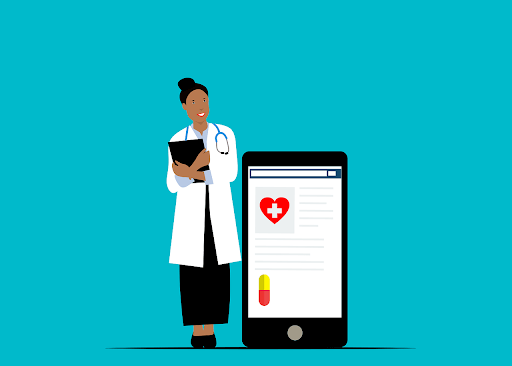The Covid-19 pandemic has shown that the modern healthcare system needs to be improved. The practice has shown that a good solution would be to introduce innovations that allow the remote provision of various services. So according to some reports, more than 800 startups in the field of digital health were funded in 2018, but this was not enough.
In the US, 75% of healthcare leaders believe using innovative technologies will improve customer service and help physicians do their job more efficiently. Let’s take a closer look at the benefits of implementing healthcare apps.
Contents
Patient Empowerment
Every year, more and more companies are creating portals for customer service through mobile devices. It aims to help patients track their health status. They allow you to measure:
- the weight;
- blood sugar level;
- heartbeat;
- blood pressure;
- cholesterol level and others.
If you know these indicators are out of the norm, you can take action to stabilize them. In addition, patients can immediately contact their doctor via mobile device when they need urgent consultation.
Mobile apps also help you track your medications and remind you if you forgot to do so or took the wrong dose. Specialized full-cycle software developers are working on the creation of such applications. Browse around here if you want to know more about it, evaluate the cost of such an application or if you think you have come up with something innovative. All this can be implemented with the help of IT professionals in the near future.
The faster and more convenient diagnostic process
It is often possible to make a diagnosis without visiting a healthcare facility, but simply during a telephone conversation. It can speed up the diagnostic process as much as possible and make it cheaper. In addition, you can transfer the results of tests and the results of other diagnostic procedures to the doctor through applications, which also helps to make a quick decision.
Help for customers who are in remote areas
Not everyone lives in large cities where the hospital is a 5-minute walk from home. There are still settlements worldwide several hundred miles from the nearest health facility.
Making such apps for healthcare purposes means that people who live in remote regions can receive medical services through mobile applications in a timely manner. With their help, they can get advice, order medicines, or sign up for diagnostic procedures at a convenient time for them.
Process optimization
The doctor can get all the necessary information about the patient’s condition thanks to mobile applications. So, the results of examinations (for several years to track the change in dynamics), complaints, and observations of a doctor can be stored here. In addition, if the patient is connected to various sensors that monitor vital signs, the doctor can receive an instant notification and take immediate action.
It is essential not only for people directly in a medical facility, for example, in intensive care, but also for cases when the patient is at home, but a nurse is monitoring him.
The simplicity of electronic prescriptions
Self-medication can be hazardous to health, so buying drugs without a prescription from your doctor is impossible in most countries.
The software that helps doctors write electronic prescriptions has been created to make it easier for patients to get an appointment. So, the client goes to the doctor on his smartphone, makes a diagnosis, and prescribes treatment. In this case, the client receives a prescription within a few minutes, and there is no need to waste time going to the hospital.
Reducing the risk of misdiagnosis
Often doctors are very busy, as they spend a lot of time filling out various documents. In addition, there is often a language barrier between the doctor and the patient, significantly complicating the diagnosis. Mobile applications can solve both problems at once.
A technical outsource partner can take into account doctors’ wishes and create a program that will simplify documentation and communication with clients as much as possible.
Transformation of industries and business models
It is assumed that shortly the healthcare system will undergo a complete transformation. The creation of innovative technologies for this industry will make it possible to simplify the challenging work of a doctor as much as possible, speed up diagnostics, and improve customer service. Some experts suggest that in the future, technologies will be created that can partially replace the doctor, for example, making a diagnosis and issuing prescriptions based on patient complaints and test results.
In addition, it is expected that more IoT will appear in the healthcare system shortly, allowing better monitoring of patients’ conditions, which significantly simplifies diagnosis and treatment in general.




